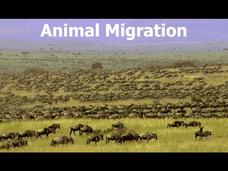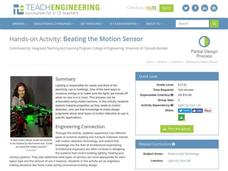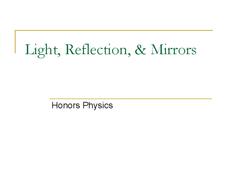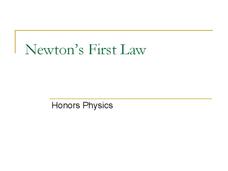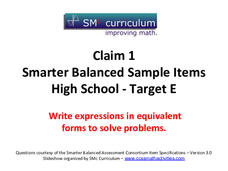Curated OER
DNA
this DNA Powerpoint describes replication, and communicates the concept that viral DNA can program cells.
Floyd County Schools
Who Is Hibernating?
Young scientists explore the wintertime behavior of common animals with this presentation on hibernation. Offering clear explanations about the who, what, where, when, and why regarding hibernation, this resource is perfect for primary...
University of Washington
Animal Migration
Here is a unique resource to use with middle and high schoolers that deals with animal migration. Viewers discover the reasons for, types of, and animals that practice this behavioral adaptation. Specific animals that are introduced...
Teacher Web
Archaebacteria and Eubacteria
Take young biologists back to the beginning of life on Earth with this presentation on bacteria. Examining the different classifications of bacteria, this presentation introduces young scientists to the concepts of autotrophs and...
Cmassengale
Bacteria: Structure and Function
For as small as they are, there sure is a lot of information for young scientists to learn about bacteria. Help simplify the subject with this instructional presentation that explores the structure, nutrition, and reproduction of...
Mr. Roughton
The Geste of Robin Hood
This isn't your traditional Robin Hood tale! Explore a Middle English ballad with your young historians, and examine the underlying structure and purpose of historical texts.
Mr. Roughton
The Travels of Marco Polo
Were the stories of Marco Polo's travels and interactions with the Mongols actually true? Using an excerpt from the book The Travels of Marco Polo, your young historians will answer guiding questions to discuss the accuracy and...
National Sailing Hall of Fame
Introduction to Sailboats
The left part of the boat is called what? An informative lesson plan and accompanying slideshow presentation introduce middle schoolers to the terminology and parts associated with a sailboat.
Mr. E. Science
Introduction to Earth Science
From the layers of Earth's spheres to latitude and longitude to looking at topographic maps, learners discover the elements of Earth's systems.
Mr. E. Science
Weathering and Soil
From types of rocks to types of weathering, learners gain knowledge on minerals, composition of soil, and the effects of weathering on Earth.
Mr. E. Science
Earthquakes
Learn about the causes of earthquakes, as well as the value of seismographs, with an informative presentation. From the Richter Scale to the Mecalli Scale, learners discover elements that make an earthquake occur.
Mr. E. Science
Climate and Climate Change
What factors make up climate? How does longitude and latitude affect climate? What is causing Earth's climate to change? These questions are the topic of a presentation that explains characteristics of climate and climate change.
Teach Engineering
Beating the Motion Sensor
I bet I can cross the room without having the lights come on. Class members set up an experiment in which they try to determine what materials will mask motion detected by a sensor. Groups predict how materials will interact with...
Teach Engineering
Load It Up!
See how a marshmallow can hold up a bridge load. Teams take a closer look at the design of bridge piers. They determine the types of loads that might affect a bridge, and, using that information, they calculate the needed cross-sectional...
Teach Engineering
Club Function
Let's get the herd to follow the rules. The activity associated with the second lesson in the unit introduces the class to the definition of a function. Individuals must gather in groups of zebras and rhinos defined by the general...
Bowels Physics
Light, Reflection, and Mirrors
Explore the connection of light, reflection, and mirrors. A comprehensive lesson introduces the basics of light in relation to reflection and mirrors. After an explanation of the vocabulary, the presentation shows how to create ray...
Bowels Physics
Newton's First Law
Force acts on objects in mysterious ways ... until now! A comprehensive presentation explains the balance of forces acting on objects. Learners draw free body diagrams to show these invisible forces and make force calculations.
NASA
Atoms, Elements, and Isotopes
Rings and golden nuggets contain the element gold, but how small can you break it down before it is no longer considered gold? A helpful presentation explains the basics about atoms, elements, and isotopes through a presentation.
CCSS Math Activities
Smarter Balanced Sample Items: High School Math – Target M
Your knowledge of graphs is a function of how much you try. Young mathematicians work on a set of 12 questions that covers graphing functions, comparing functions, and rewriting functions in different forms to determine key features....
CCSS Math Activities
Smarter Balanced Sample Items: High School Math – Target O
Trigger an increased understanding of trigonometry. Young mathematicians answer a set of questions that require finding trigonometric ratios using similarity and solving real-world problems involving trigonometry. The questions all come...
CCSS Math Activities
Smarter Balanced Sample Items: High School Math – Target E
Pupils rewrite expressions in equivalent forms to identify key features. They use the vertex and factored forms of quadratic expressions to identify the extrema and intercepts. To finish the installment of the Claim 1 Item Slide Show...
CCSS Math Activities
Smarter Balanced Sample Items: High School Math – Target G
G is for generating equations. Scholars answer eight questions covering the SBAC Claim 1 Target G high school item specifications. They write one-variable and multi-variable equations and inequalities to model relationships between...
CCSS Math Activities
Smarter Balanced Sample Items: High School Math – Target F
All polymaths know about polynomials. Scholars look at six problems aligned to the SBAC Claim 1 Target F for high school. They must perform operations on polynomials, including problems where the coefficient is a letter. The presentation...
Livaudais-Baker English Classroom
Lord of the Flies: William Golding's Masterpiece
Spoiler Alert! An 18-slide presentation includes information about author William Golding, his experiences reflected in Lord of the Flies, a summary of the story, the political and religious allegorical levels of the novel, and the themes.
Other popular searches
- Authors Purpose Powerpoint
- Jeopardy Powerpoint
- Algebra 1 Powerpoint
- Powerpoint Math Lessons
- Powerpoint Lessons
- Science Powerpoint
- Cell Structure Powerpoint
- Powerpoint Rock Cycle
- Powerpoint Math
- Comic Strips Powerpoint
- Forensic Science Powerpoint
- Lesson Plans + Powerpoint




